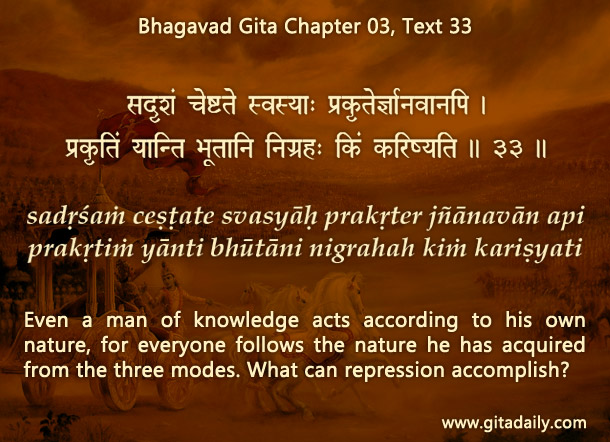Some people ask, “Don’t the many rules of spiritual life suppress our nature?”
No, this apprehension comes from conflating two distinct senses of the word nature.
Gita wisdom places basic human natures in four broad types (varnas). The Gita (03.33) states categorically that this nature can’t be suppressed – all people, even the knowledgeable, act according to their nature.
Clearly, by nature, here the Gita doesn’t refer to our lower nature that comprises selfish urges such as lust, greed and anger. That nature is actually an unnatural accretion on us, pure souls. The rules of spiritual life help us overcome this lower nature, thereby empowering us to act with moral and spiritual integrity.
But distinct from such lower nature, we have our own natural constellation of interests and talents – a constellation that correlates with our varna. Spiritual growth requires not changing this nature, but changing how we use it: less for our self-centered aggrandizement, more for selfless service. Bhakti-yoga takes such selflessness to its zenith, guiding us to use our nature for serving the One who is the supreme benefactor of all.
In the Gita’s context, the immutability of one’s nature implies that the natural warrior Arjuna can’t sustain for long the role of a renounced sage – a role he was considering to get out of the impending fratricidal war. The Gita guides him to see the challenges in his natural vocation as opportunities for expanding his selflessness beyond blood relations. By doing his martial duty devotionally, he can do justice to his archery expertise and help re-establish dharma, moral and spiritual order.
Similarly, when we practice bhakti-yoga, we overcome our lower nature and become empowered to use our natural interests and talents in Krishna’s service. Thus, we can better play our parts, small or big, in his plan for everyone’s good.
To know more about this verse, please click on the image
Explanation of article:
Podcast:
Download by “right-click and save”



KRISHNA BHAKTI is our purification center